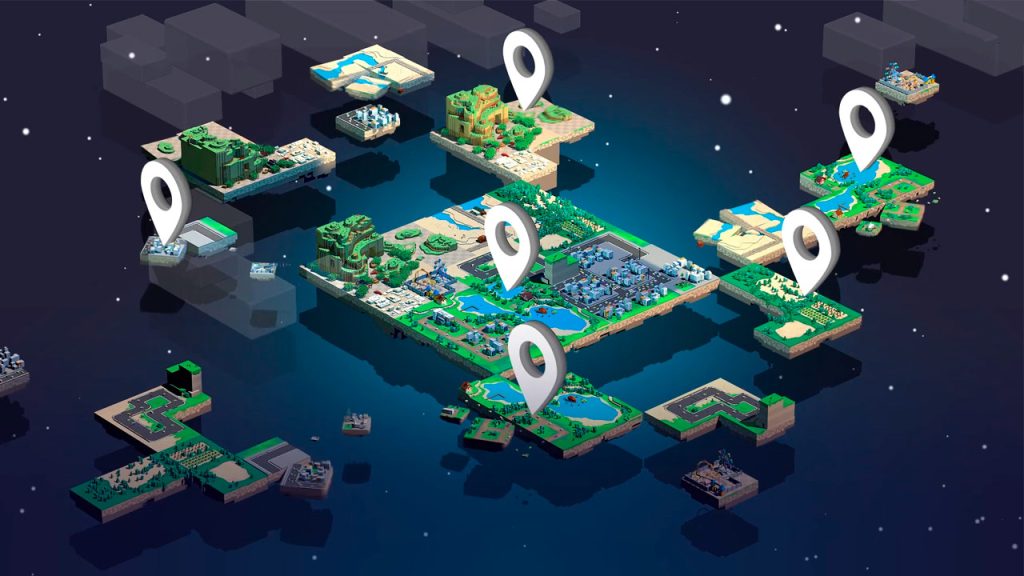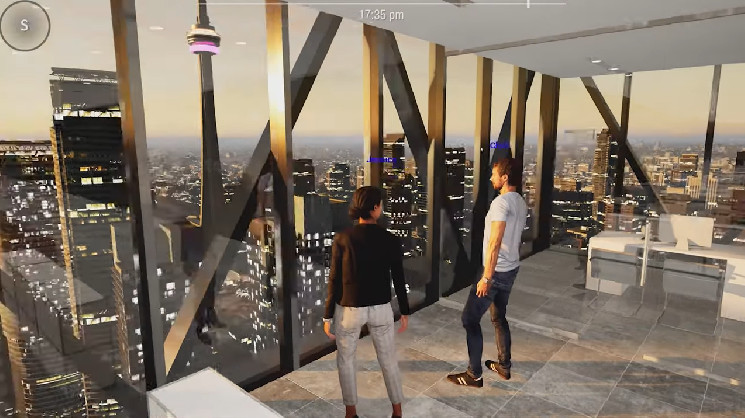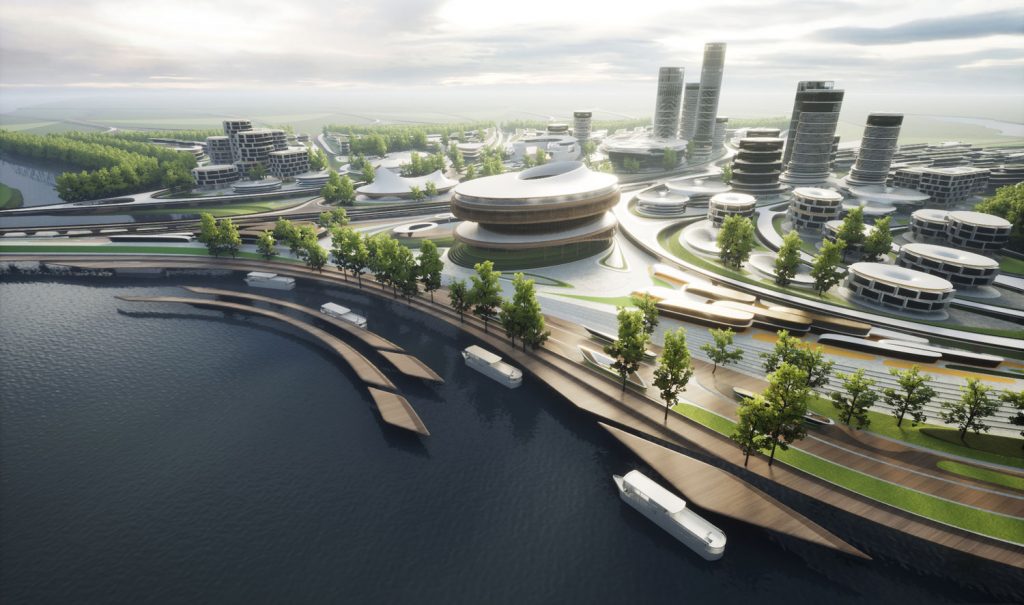With an expected CAGR of 31.2% from 2022 to 2028, the metaverse is one of the most rapidly growing economies globally. Developing a virtual world through the metaverse offers infinite possibilities for creating better spatial experiences. Its immersive and engaging virtual environment makes digital interactions feel real. This quality has grabbed the attention of leading tech companies who are now vouching for metaverse as the future of the built environment. Thus, investors and developers are looking at the metaverse as a potential investment for enhancing user experience and the saleability of a place.
What is Metaverse Real Estate?
Real estate in the metaverse refers to land parcels and buildings in the virtual environment. The land in the metaverse is virtual, implying that it has no physical attributes. Land parcels in the metaverse are essentially pixels that act as programmable spaces in virtual reality platforms. These lands can be used to develop workplaces, playgrounds, and meeting rooms.
Investors can buy land plots from multiple metaverse platforms providing unique virtual environments. Each of these platforms provides various functions; hence, no one platform represents the metaverse in totality. The Sandbox, Decentraland, Metahero, Horizon Worlds, and Celebrity Atlas are some of the most popular metaverse platforms for real estate developers to invest in.
Why and How to Purchase Real Estate in Metaverse?
Metaverse real estate provides people with a place to connect with people located in distant locations across the globe. Developers can monetize their virtual properties to advertise services, host events, and provide unique visitor experiences. Similar to physical land, real estate properties can also be rented or leased. Hence, investing in metaverse real estate can be profitable for key players in the AEC industry.
In 2017, during Decentraland’s first LAND auction at the Terraform Event, a plot of land was sold at an average of $20. In 2021, the same parcels of land were sold for an average above $6,000. Further, the beginning of 2022 witnessed a boom in the metaverse real estate prices, with property costs rising to $15,000.
For land purchases in the metaverse, the investor must require a virtual wallet to make all transactions. MetaMask is one of the most trusted browser-based wallets for making digital transactions. The digital wallet will have to be filled with cryptocurrency since it is the virtual world’s currency. Investors can study the features of various metaverse platforms and compare them against each other before registering.
Following this, the investor can create a digital avatar of themselves and take a tutorial on the platform to get acquainted with its virtual environment. After this, the plot selection and buying process can begin. Purchasing a metaverse property involves a deed of ownership, a unique code on a blockchain. This code certifies the ownership rights over a piece of virtual land. The purchased plot can be used to develop a new building or a digital twin of physical space.
Benefits of Investing in Metaverse Real Estate
The key benefit of metaverse real estate is that it compensates for the lack of space in the physical world. For instance, employers can create conference rooms and event halls in the metaverse if an office lacks physical meeting spaces. Further, the metaverse provides a seamless collaboration experience that allows people living in different parts of the world to communicate with each other.
Project marketing and property showcase is other significant benefit of the metaverse in the real estate sector. Developers are creating immersive metaverse experiences for potential buyers to witness their “dream house” in virtual reality. Equipped with VR headsets and compatible smartphones, buyers can take virtual reality tours of various places worldwide.
Many countries such as Germany, Croatia, Hungary, Norway, Mauritius, Iceland, Spain Costa Rica have invested in virtual tourism with the aid of the metaverse. Tourists can look at the most popular public buildings, experience their charm, and indulge in regional activities by weaving VR headsets.
Risks Associated with Metaverse Real Estate
Investing in the metaverse is promising, but it can also pose high risk owing to its relative newness. Although researchers predict that the metaverse has an excellent scope for growth, it is very early to predict how the industry will grow. For instance, if a metaverse platform decides to go offline permanently, the real estate in them would also become non-existent. In this case, the value of investment made by real estate developers would be questionable.
The valuation of physical land gets appreciated or depreciated based on market conditions, environment, and other tangible factors. But, all these factors have no impact on metaverse real estate since the virtual environment can be controlled. So, the only and most important variable that impacts the value of the real estate in the metaverse is the volatility of cryptocurrencies.
Developing and Managing Real Estate in the Metaverse
In the metaverse, developers can assign property development roles to architects. In the case of neighborhood developers, urban planners and urban designers can be involved. Architects can design the virtual world by planning the land parcels to maximize space utilization. Further, the land in the metaverse needs management similar to physical property management. The virtual world can potentially grow real estate through effective virtual property management, rental assortment, dealing with client queries, and general land maintenance.
In Conclusion
Investing in metaverse real estate is associated with high risks and equally high rewards. The uncertainties of the virtual world can exponentially multiply to reap enormous benefits or deteriorate into a complete loss of investments. So, before investing, the developer must ensure that they have complete knowledge and understanding of how the metaverse works.
Investors must identify their risk appetite, weigh all their investment options, and speak to experts before investing. Considering all these factors, the fact that the metaverse will define the future of living is undeniable. Therefore, all key players in the AEC industry should prepare themselves for the dawn of this next-generation technology that is empowering, immersive, and engaging.
Read More: news.google.com

















 Bitcoin
Bitcoin  Ethereum
Ethereum  Tether
Tether  XRP
XRP  Solana
Solana  Dogecoin
Dogecoin  USDC
USDC  Cardano
Cardano  Lido Staked Ether
Lido Staked Ether  TRON
TRON  Sui
Sui  Avalanche
Avalanche  Toncoin
Toncoin  Wrapped stETH
Wrapped stETH  Chainlink
Chainlink  Shiba Inu
Shiba Inu  Wrapped Bitcoin
Wrapped Bitcoin  Stellar
Stellar  Hedera
Hedera  Polkadot
Polkadot  WETH
WETH  Bitcoin Cash
Bitcoin Cash  LEO Token
LEO Token  Uniswap
Uniswap  Litecoin
Litecoin  Pepe
Pepe  Hyperliquid
Hyperliquid  Wrapped eETH
Wrapped eETH  NEAR Protocol
NEAR Protocol  USDS
USDS  Ethena USDe
Ethena USDe  Aptos
Aptos  Internet Computer
Internet Computer  Aave
Aave  Mantle
Mantle  Cronos
Cronos  POL (ex-MATIC)
POL (ex-MATIC)  Ethereum Classic
Ethereum Classic  MANTRA
MANTRA  Render
Render  Monero
Monero  Bittensor
Bittensor  Artificial Superintelligence Alliance
Artificial Superintelligence Alliance  Dai
Dai  Tokenize Xchange
Tokenize Xchange  Filecoin
Filecoin  Arbitrum
Arbitrum